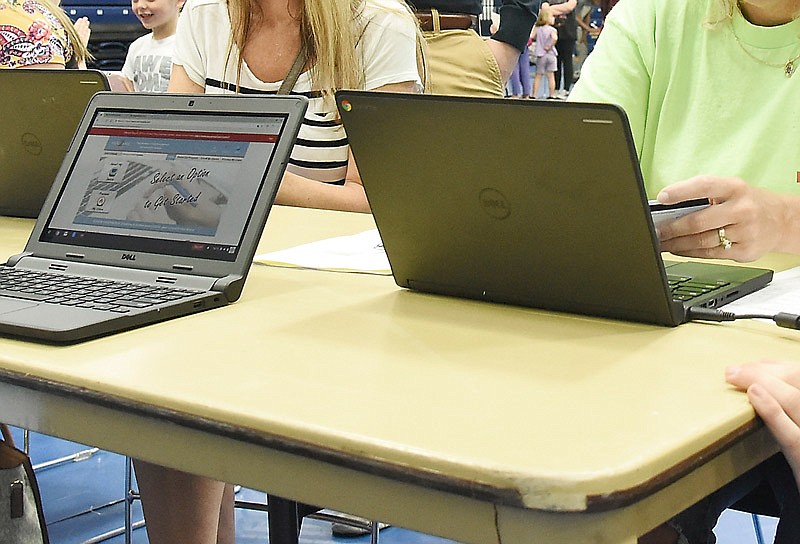Using COVID-19 relief money, the Missouri Department of Elementary and Secondary Education plans to start initiatives to accelerate student learning, address the digital divide and invest in the teacher workforce.
On June 17, DESE submitted the application to the U.S. Department of Education required to receive Missouri's third allocation for the American Rescue Plan Elementary and Secondary School Emergency Relief fund, often referred to by DESE as ESSER III.
Missouri received $208,443,300 under ESSER I and $871,172,291 under ESSER II. School districts and charter schools were allocated 90 percent of each of those amounts.
The remaining 10 percent is being used for state initiatives, including free teacher professional development on distanced instruction, social-emotional learning resources, student connectivity grants, teacher recruitment and retention grants, expansion of the Missouri Leadership Development System for principals, transportation supplements, and other smaller grants, according to DESE.
For ESSER III, Missouri will receive $1.96 billion, 90 percent of which will be distributed to school districts and charter schools to spend on a wide range of allowable uses to address the effects of the COVID-19 pandemic.
DESE will use the remaining 10 percent for state-level projects and initiatives.
The amount of ESSER money school districts receive is proportional to the amount of Title I money they receive. Title I provides financial assistance to schools with high numbers of children from low-income families.
For Cole County schools, total preliminary ESSER III allocations show the Jefferson City School District will receive $14,574,503, the Blair Oaks R-2 School District in Wardsville will receive $215,236, the Cole County R-1 School District in Russellville will receive $783,354, and the Cole County R-5 School District in Eugene will receive $895,032.
This is the preliminary amount of money available to school districts once the state Legislature has appropriated the funds and the district and state have approved applications.
The timeline for when DESE and school districts can have access to the money has yet to be determined.
Before it can be implemented, DESE's plan for how to spend the money needs approval from the U.S. Education Department and spending authority from the governor and the Missouri Legislature, provided through the state budget process.
DESE plans to issue teacher recruitment and retention grants for all school districts and charter schools, provide increased professional learning resources for teachers, redesign Missouri's assessment system and more.
The teacher pipeline has been declining for 10 years, but the pandemic exacerbated teacher recruitment and retention challenges in Missouri. Using ESSER III money, DESE plans to make recruitment grants available to teacher certification programs and make $10,000 grants available to all school districts and charter schools to establish or expand local Grow Your Own programs.
Grow Your Own is designed to recruit, develop and retain teachers. It aims to recruit those who are connected to a school or community but may not have considered teaching or need additional resources to enter the profession.
DESE would also like to double the capacity of the Missouri Leadership Development System to provide leadership training to all Missouri school principals.
With the goal of accelerating student learning, DESE plans to place reading and math specialists in each Regional Professional Development Center in the state to support teachers in reading and math instruction.
DESE will also invest in a competency-based learning program to assess and advance students across the state. Competency-based learning "refers to systems of instruction, assessment, grading and academic reporting" based on students demonstrating they "have learned the knowledge and skills they are expected to learn as they progress through their education," according to the Glossary of Education Reform.
The goal is to accelerate learning for all students, especially those who are behind. The competency-based learning program will include a new assessment system that will bring a greater focus to early childhood literacy, be fully aligned to the priority learning standards and better support learning processes, according to DESE.
DESE would also like to upgrade the 15-year-old Missouri Comprehensive Data System, designed to collect and analyze public education data. DESE has collected data to gauge the effects of the COVID-19 pandemic, but its ability to gather, analyze and communicate that data in near real time is limited by the current system.
As additional data from the 2020-21 school year is available - such as assessment results, final enrollment and attendance figures - DESE will further analyze the impact of the COVID-19 pandemic on students and use these analyses to further decide how to allocate the resources.
When spending authority is granted, DESE will identify specific uses for funding required to be spent on after-school and summer programs and expects to examine how best to "gauge the social, emotional and mental health needs of students and staff, as well as how to meet those needs," according to DESE.
It is also considering establishing intensive tutoring programs for students who are struggling.

